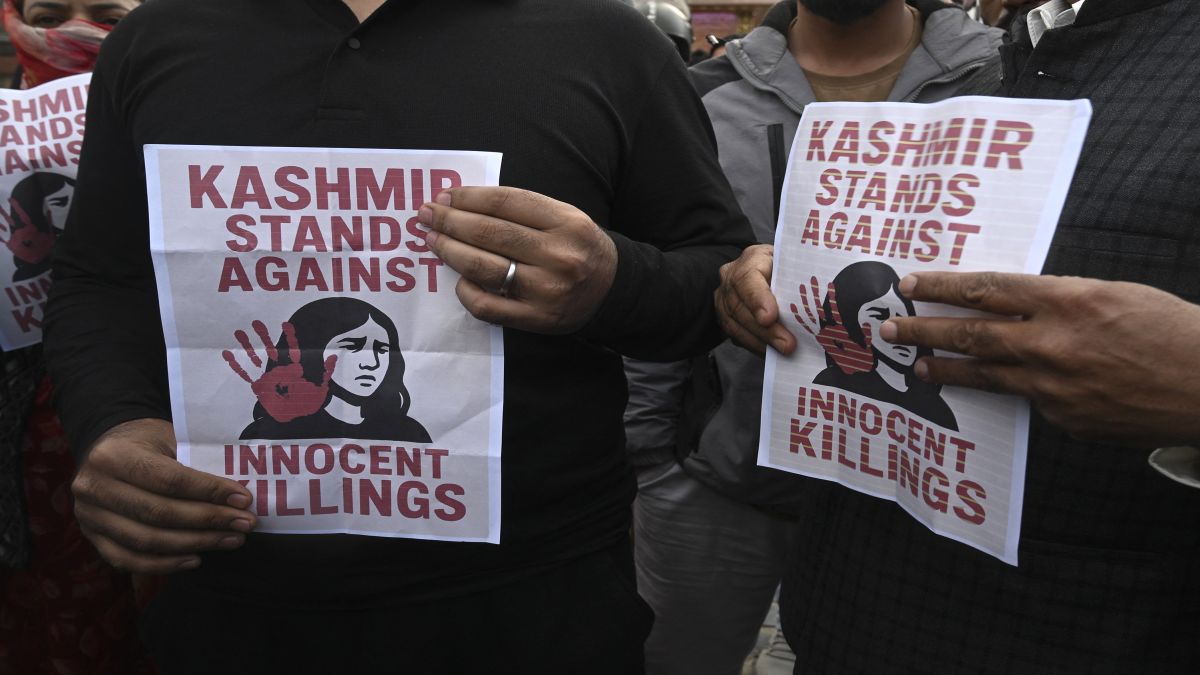“I was saved as I could recite the Kalma.”
This is the heart-breaking and shocking tale of Assam University’s Associate Professor Debasish Bhattacharya , who was in Pahalgam with his family, when terrorists emerged from the pine tree jungles in the Baisaran Valley and shot dead 26 people, mostly tourists .
Recounting his shocking tale of survival, the professor, who teaches Bengali, narrates that he was holidaying with his family when the gun-toting terrorists converged around them. He said the people around him crouched on the ground and started reciting the Kalma, a declaration of faith that forms the core beliefs of Muslims.
“So I also followed them. A terrorist walked up to us and shot the man next to me. Then he looked at me and asked what I was doing. I just recited the Kalma louder and did not reply to his question. I don’t know what happened, he just turned around and left,” Bhattacharya is quoted as saying.
The professor said after the terrorists left, he along with his wife and son immediately abandoned the place and walked back. “I somehow managed to escape by crossing the fence,” he said.
Other survivors of the attack also shared similar tales in which the terrorists asked them to recite the Kalma. As Sushil Nathaniel’s family told news agency PTI that the gunmen told the LIC manager from Indore to recite the Kalma before shooting him dead. His cousin Sanjay Kumrawat told PTI, “We have spoken to Sushil Nathaniel’s wife and son over the phone. They told us that terrorists asked Sushil’s name and forced him to kneel down, they then asked him to recite the Kalma. When Sushil said that he could not recite Kalma, the terrorists shot him.”
This has got many asking what is the Kalma and its significance in Islam. We explain.
What is the Kalma?
The Kalma is a declaration of faith and the belief in the oneness of Allah and the prophethood of Muhammad. The Kalma are the basic beliefs of Muslims all around the world. They practice these beliefs and incorporate the basic principles in their lives.
There are six different types of Kalmas and it is said that reciting these regularly is a must for all Muslims as it reminds them of their commitment to worshipping Allah and the teachings of Prophet Muhammad.
It is important for all Muslims around the world to understand them, as they convey the fundamental truths of Islam, note experts.
Theological experts have said that the Kalmas should be recited early in the morning when one is about to start their day and at the end of the day, before going to bed. They note that Kalmas should also be recited when expressing gratitude or in times of trouble, as it provides solace and guidance.
What are the different types of Kalmas?
In Islam, there are six different types of Kalma, each being significant to the religion of Islam. The first is known as Kalma Tayyib and declares the oneness of Allah and the finality of Muhammad’s prophethood.
“La ilaha illallah wahdahu la sharika lahu, lahu wa ashhadu anna Muhammadan abduhoo wa rasooluhu.”
This means there is no God but Allah and Muhammad is the messenger of Allah. It is the most important Kalma and is the foundation of a Muslim’s faith.
The next is Kalma Shahada, which is a testimony of faith, reaffirming the belief in Allah’s oneness and Muhammad’s prophethood.
“Ashhadu alla ilaha illallah wahdahu la sharika lahu wa ashhadu anna Muhammadan abduhoo wa rasooluhu.” Translated, it means: “I bear witness that there is no God but Allah, He is One, without any partner, and I bear witness that Muhammad is His messenger.”
The third kalma — Kalma Tamjeed — deals with the glorification and praise of Allah. It expresses a deep sense of gratitude for Allah’s mercy and reflects a Muslim’s acknowledgment of His supreme authority over all things.
The fourth is Kalma Tawheed. It is a reinforcement in the belief in the oneness of Allah. It reasserts that there is no partner with Allah and emphasises the central tenet of Islamic monotheism. When translated from Arabic, it reads: “There is none worthy of worship except Allah. He is alone and has no partner. To Him belongs the Kingdom and for Him is all praise. He gives life and causes death. In His hand is all good and He has power over everything.”
In Islam, the fifth kalma is Kalma Astaghfar. It is a request for pardon for any sins committed and a way to turn back to Allah in repentance. This Kalma reflects the importance of humility and the need for divine mercy.
The final kalma is Kalma Radde Kufr, which is rejecting disbelief. It is a form of a prayer in which Muslims denounce polytheism and declares allegiance to Allah.
It reads, “Allahumma innii a’udhu bika min an ushrika bika shai-anw- wa ana a’lamu bihii. Was tagh fi ru ka limaa laa alamu bihee. Tubtu anhu wa tabarra-tu min al-kufri wash-shirki wal-kizdhbi wal-ghiibati wal-bid’ati wan-namiimati wal fawaahishi wal-buhtani w-al-ma’aasii kulliha. Wa aslamtu wa aquulu La illaha illAllahu Muhammadur RasulAllah.”
It translates to, “O, Allah! I seek refuge in You from that I should ascribe any partner with You knowingly. I seek Your forgiveness for the sin of which I have no knowledge. I repent from it. And becoming disgusted by disbelief and idolatry, lying and backbiting, innovation and slander, lewdness and abomination, and all other acts of disobedience, I submit to Your will.”
With inputs from agencies


)

)
)
)
)
)
)
)
)



